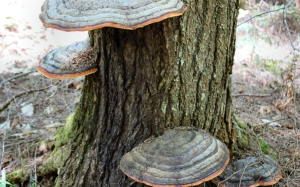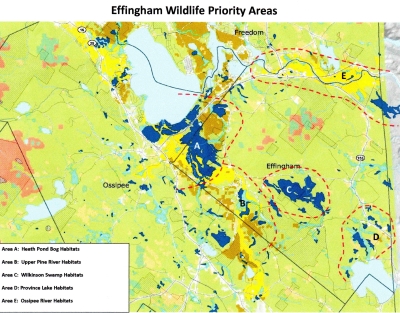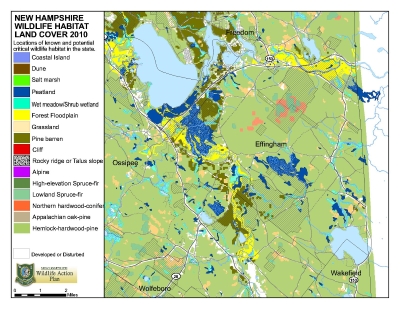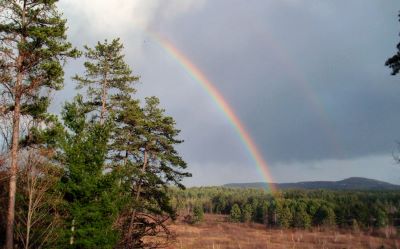About the Commission
The Effingham Conservation Commission (ECC), established in 1976, is a volunteer advisory board appointed by the Board of Selectmen. Our primary responsibility is to protect the natural resources of the community. The ECC supports and advises the Board of Selectmen, Planning Board, and Zoning Board of Adjustment on conservation issues.
- We assist landowners, review, and provide recommendations on wetland permit applications prior to forwarding the applications to the NHDES Wetlands Bureau.
- ECC’s duties include keeping an index of open spaces, watersheds, aquifers, forests and woodland environments. When possible, we work to control non-native invasive plants. The Commission stewards and monitors town conservation properties.
- The ECC welcomes the public to walk the new Pine River Cherubini Preserve trail that connects the property to an old logging road and continues to the Pine River to one of the best views of nature in Effingham. Trailhead on Pine River Rd.
The ECC believes our community is sustained by its natural landscapes, clean water, forests and varied habitats for animals and plants. The Commission sees its mission as, working to preserve, protect, and properly utilize these resources for present and future residents of Effingham.
Contact Information
- Contact: Emelyn Albert
- Email: ealbert3@roadrunner.com
ECC Minutes & Ongoing Activities

- Working with landowners on wetland permitting projects and reviewing wetland permits.
- Advising the town Planning Board and Select Board on natural resource issues.
- Managing town conservation properties.
- Coordinating the annual town roadside clean-up. Although Earth Day cleanup is the centerpiece of Keeping Effingham Litter Free (KELF) each year, KELF volunteers also cover their sections of roadside as they can during the year.
- Sponsoring an annual Earth Day poster contest at Effingham Elementary School.
- Monitoring our lakes and rivers for invasive plants.
- Providing outreach and education on our natural resources.
- Maintaining a town natural resource inventory.
- Assisting State environmental agencies with Effingham issues.
Effingham Conservation Committee Maps
For all our ECC maps please visit our Documents page under ECC Maps
Wildlife Priority Area

Wildlife Habitat Landcover

Effingham Conservation Committee Reports
To view or download reports, please click on the links below.
- Conservation Commission Brochure-2014
- Conservation-Commission-Annual-Report-2013
- Natural Resources Inventory-2013
- Wetland-Inventory-and-Protection-Project-Final-Report
- Wetlands-Mapping-Survey
- Wildlife-Action-Plan-Final-Report
- 2006 Effingham Culvert Study
Conserved Lands in Effingham
For a list of our conserved lands, please click on the following link ECC Conserved Lands

ECC Frequently Asked Questions
What are Wetlands
- Those areas that are inundated or saturated by surface or ground waters at a frequency and duration sufficient to support, and that under normal conditions do support a prevalence of vegetation adapted for life in saturated soil conditions. Wetlands generally include, but are not limited to, swamps, marshes, bogs, and similar areas.
Does Effingham have a wetland Ordinance?
- Yes, it is Article 16 of the Effingham Zoning Ordinance.
Where are the conservation properties?
- The complete list is available in the Natural Resource Chapter of the Effingham Master Plan or by contacting the ECC, 68 School St., Effingham, NH 03882
Something is eating the bark off the bottom of my trees. What could this be?
- If the animal is chewing off more than the bark and taking the entire tree down, it is probably a beaver. If it is just eating the bark around the trees, it could be a vole, mouse, porcupine or possibly a rabbit. To prevent further damage to the trees, you can purchase plastic mouse guards that can be wrapped around the base of the trees. You can also purchase 1/4″ hardware cloth from a hardware store and wrap a 2′ length of it around the trunk. (Hardware cloth is an inexpensive galvanized mesh that these animals cannot chew through).
I saw a raccoon (fox, skunk, etc) during the day. Is it rabid?
- Not necessarily. These animals are generally nocturnal (active during the night), however, it is not unusual to see them during the daytime. For example, during the spring, adults will be foraging for food day and night for their young. If you see any type of unusual behavior, such as an animal pacing back and forth, or signs of aggression, contact the N.H. Fish and Game Dispatch Line at (603) 271-3361 or call your local police.
What can I do about flying squirrels or other small animals that have taken up winter residence in my attic or other part of the house?
- These creatures are looking for a warm, safe place to take up residency for the winter. An overhanging branch or tree limb is an open invitation for these species to get onto your roof and possibly into your home. Trim the overhangs as much as possible to prevent animals from easily getting onto your roof. If an animal gets into your home, you will need to remove it, if not on your own, then by contacting a Wildlife Control Operator to assist with the removal. Once the animal is removed, you need to determine how the animal got in; eaves, cracks in the foundation, an open door, etc. Once you locate the entryway you need to block it off so the animal cannot return. You can also contact USDA Wildlife Services at (603) 223-6832. They can give you information to assist you with the removal of the animals.
What is KELF? And how can I participate?
- KELF (Keep Effingham Litter Free) is an informal group of residents who keep their roads clean of litter. Free bags and gloves are available at the Town Offices and the Effingham Library. Please contact the ECC if you would like to join KELF and help keep Effingham litter free.
ECC Helpful Links
National
- Home Science: Backyard Conservation
- Environmental Protection Agent
- Fish and Wildlife Service
- National Park Service
Regional
- Conservation Law Foundation
- Saco River Corridor Commission
- NASA Global Change Master Directory
- The Nature Conservancy
- NH Audubon
- NH Conservation Real Estate
- NH Coverts
- New England Grassroots Environment Fund
- Lakes Region Planning Commission
- NH Green Works
- NH Lakes Association
- River Network
- Jordan Institute
- Environmental System and Research Institute
- Rural Community Assistance Partnership
- NH Project Learning Tree
- NH Sea Grant UNH
- NH Rivers Council
- Society for the Protection NH Forests
- SPACE: Statewide Program of Action to Conserve our Environment
- UNH Cooperative Extension
- UNH Water Resources Research Center
State
- GRANIT: Geographically Referenced Analysis Information Transfer System
- Maine Department of Environmental Protection
- NH Department of Environmental Services
- NH Department of Natural and Cultural Resources
- NH Fish and Game
- NH Fish and Game Wildlife Action Plan